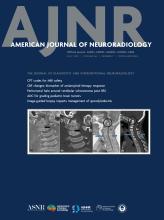This article requires a subscription to view the full text. If you have a subscription you may use the login form below to view the article. Access to this article can also be purchased.
Abstract
BACKGROUND AND PURPOSE: The aim is to determine the most common MRI interpretation errors in patients with medically refractory epilepsy (MRE) according to our experience in a tertiary academic center with a large volume epilepsy program, to raise awareness of the “blind spots” in imaging patients with MRE, and to highlight the importance of combining clinical and electroencephalographic information to obtain the most accurate diagnosis.
MATERIALS AND METHODS: This is a retrospective observational study. All patients with MRE who underwent MRI brain (on 3T, with dedicated epilepsy protocol), and who were discussed at the weekly interdisciplinary epilepsy conference in our center between January 2008 and July 2023 were included. The initial MRI interpretation and final MRI interpretation results were reviewed.
RESULTS: A total of 886 patients with MRE were included. Three hundred patients were MRI-negative (33.86%), diagnoses were missed in 95 patients (10.7%), a second diagnosis was missed in patients with dual pathologies in 42 patients (4.74%), findings were misinterpreted in 4 patients (0.45%), an overcall was made in 2 patients (0.2%), and in 5 patients the correct diagnosis was discussed but erroneously deemed absent on initial interpretation (0.56%), resulting in a total of 148 discrepant MRI reports. Mesial temporal sclerosis comprised the most common pathology encountered overall, followed by encephalomalacia related to prior insult, enlarged amygdala (EA), malformations of cortical development, cavernoma, and ulegyria. The relative proportion of missed focal cortical dysplasia, encephalocele, and EA accounted for the most common misses/misdiagnoses.
CONCLUSIONS: Evaluation of patients with MRE requires excellent interdisciplinary care. Input from all members of the interdisciplinary team is essential for accurate interpretation of MRI in patients with MRE for the neuroradiologist. We hope to inform radiologists of commonly overlooked pathologies in MRI brain interpretation for patients with epilepsy. In doing so, we want to maximize the yield of initial MRI interpretation in these patients.
ABBREVIATIONS:
- EA
- enlarged amygdala
- EEG
- electroencephalogram
- EMR
- electronic medical record
- FCD
- focal cortical dysplasia
- MCD
- malformations of cortical development
- MEG
- magnetoencephalography
- MRE
- medically refractory epilepsy
- MTS
- mesial temporal sclerosis
- PVNH
- periventricular nodular heterotopia
- SCNH
- subcortical nodular heterotopia
- TLE
- temporal lobe epilepsy
- © 2025 by American Journal of Neuroradiology












